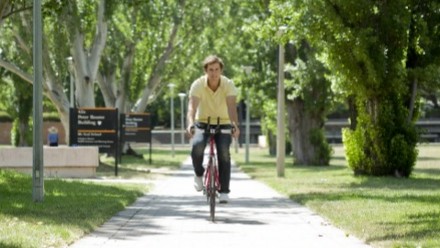Best foot forward
Packing only the essentials, Brad Carron-Arthur set out solo on the epic journey, with only a vague route and a mobile phone for support.
Brad Carron-Arthur was in trouble. Standing on a roadside in the middle of nowhere in Far North Queensland, he was struggling with the oppressive heat and humidity, the blisters on his feet rubbing painfully as he fought to stay upright. His drinking water had run out hours before and he was experiencing the first signs of serious dehydration.
And then, on the hazy horizon, he saw a car approaching. After signalling the driver to stop, he shuffled over to the window, leaned in and told them he needed some help.
“We know,” said the driver. “We heard about you a few towns back, and thought we’d bring you some food and water, see that you were ok.”
Four months earlier, the ANU graduate had embarked on a 5,000-kilometre journey from Canberra to Cape York to raise money for the Australian Foundation for Mental Health Research (AFFIRM).
“I wanted to direct all my energy towards a cause that was really worthwhile and close to my heart. That cause was mental health,” says Carron-Arthur.
“My Dad suffered from depression for about 15 years, but in 2009 he began to recover because he started to seek treatment.
“He started living life to the fullest again and taking up all sorts of sports, which really inspired me to chase the things I’m passionate about, and running happens to be one of those things.”
Packing only the essentials – toothbrush, toothpaste and a snake-bite bandage – Carron- Arthur set out solo on the epic journey, with only a vague route and a mobile phone for support.
It took him 131 days and five pairs of shoes to complete his journey. Running for such long distances meant the days were often lonely. He stayed positive by focusing on where he was, rather than thinking about how much longer he had to go.
“Rather than run the shorter path from Noosa to Bundaberg, I took the longer route and decided to run across the beaches,” he says.
“Even though it was pretty agonising running across the soft sand on Fraser Island, I was in much better spirits because of the scenery that accompanied it.”
But battling dehydration and exhaustion, the sweltering hot, humid days eventually took their toll.
Quite close to the finishing line, after running for nearly 50 kilometres without water, Carron-Arthur started to feel like he couldn’t go on.
“After four consecutive days of running on sand, I got lost and had to paddle through a flooded creek,” he says. “I remember grabbing tree branches to make it through; the water was above my head, getting into my backpack and ruining my food.
“After all that, I still had 30 kilometres to run, and then the battery died on my phone. All these factors combined with sheer physical exhaustion – it was like being drunk but feeling every painful detail.
“For about a month after that I woke up without the zest and sense of adventure that had gotten me there – it was more like fear was the only thing keeping me going.”
In the end, it was the kindness of a family in Bundaberg that allowed Carron-Arthur to recover and regain his motivation for the run; throughout the journey, he depended on the generosity of strangers to welcome him into their homes and offer a bed and a meal for the night.
“Having that support really got me through,” he says.
“It also made me think a lot about my family and friends back in Canberra; I was most looking forward to seeing them when I got back.”
Several months after finishing the run and raising more than $30,000 for AFFIRM, Carron-Arthur was awarded the 2012 Young Canberra Citizen of the Year Award in recognition of his efforts.
“It was a great honour, I was really stoked to win, and I wasn’t expecting it. I’m third-generation Canberran so it meant a lot for me to win as I was produced by this city,” he says.
“Having done the run and raised money for mental health, it’s become an increasingly important cause for me, so I’m really grateful for the opportunity to use the role to raise awareness for mental health.”
Carron-Arthur has also taken his passion for mental health and applied it to his everyday life, recently taking on a research position at the Centre for Mental Health Research at ANU.
“A lot of the work we do here involves developing online programs to allow people to look at their own mental health and assess their own thoughts anonymously,” says Carron-Arthur.
“Most people don’t want to ask for help until they perceive it to be at a crisis point – a lot of people know to ask for help when they’ve broken their leg, but the point at which your mind is broken is already too late.”
And as Carron-Arthur knows well, offering a little help to someone who might need it can be a life- changing experience.
ppreciate it here.
“I hope after I’m done I can find a job. Probably get myself familiar with what work is like. I hope to stay in Australia to do that. It’s a great place to live.”










